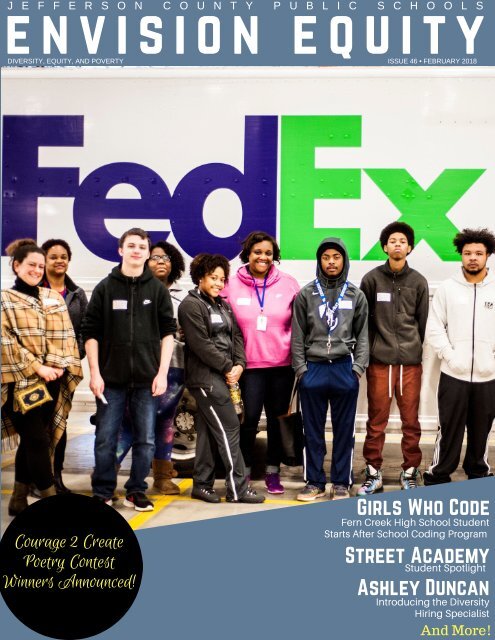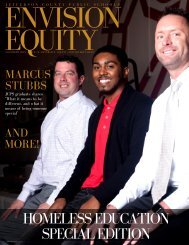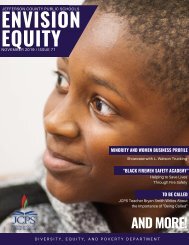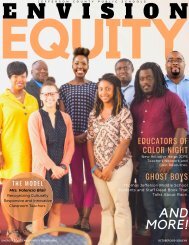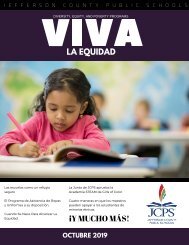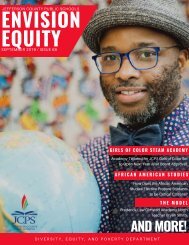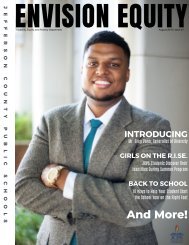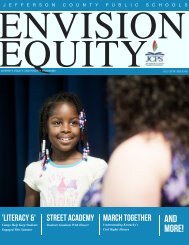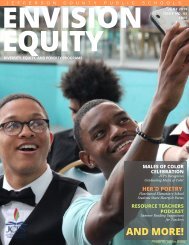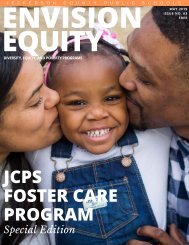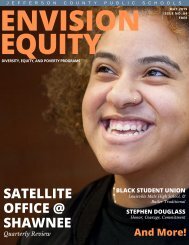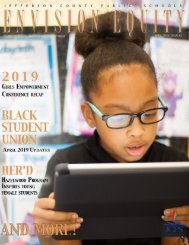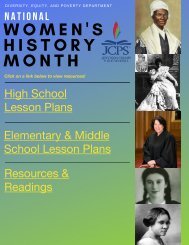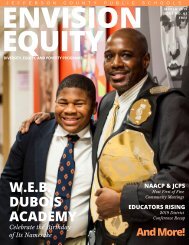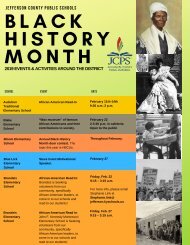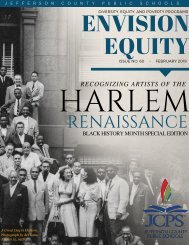February 2018 Edition of Envision Equity
You also want an ePaper? Increase the reach of your titles
YUMPU automatically turns print PDFs into web optimized ePapers that Google loves.
1<br />
<br />
Photo, Getty Images
Above, Moore Traditional students tour the FedEx<br />
plant during a field trip. Photo, Abdul Sharif.<br />
PRE-EMPLOYMENT<br />
TRANSITION SERVICES FOR<br />
SPECIAL POPULATIONS<br />
Outcomes, Opportunities, and Actions<br />
By Dr. Jason Wheatley—Specialist, ECE Programs<br />
Post-school outcomes for our community’s<br />
youth with disabilities have been far less<br />
successful when compared to non-disabled<br />
peers. The reality is, when youth with disabilities<br />
are <strong>of</strong> working-age, they are 40% less likely to be<br />
employed than their peers. Additionally, many <strong>of</strong><br />
our students with disabilities who do obtain<br />
employment will earn far less than those without<br />
disabilities. The disparity is even more realized,<br />
amongst our population with disabilities, by<br />
persons <strong>of</strong> color and persons with low levels <strong>of</strong><br />
education. In an examination <strong>of</strong> projected<br />
employment growth rate data, this narrative is<br />
unlikely to change in the next five years as<br />
persons with disabilities are <strong>of</strong>ten employed in<br />
jobs that are declining in growth.<br />
2<br />
Continue on next page
ENVISION EQUITY FEBRUARY <strong>2018</strong><br />
On July 22, 2014, President Barack Obama<br />
signed into law the Workforce Innovation and<br />
Opportunity Act (WIOA). While the act seeks<br />
to provide coordination through the theme <strong>of</strong><br />
partnership, implications have been<br />
systemically enjoyed amongst local<br />
education agencies and rehabilitation<br />
agencies nationwide. In Kentucky, the<br />
Jefferson County Special<br />
Education Cooperative<br />
and the Office <strong>of</strong><br />
Vocational<br />
Rehabilitation (OVR)<br />
entered into an<br />
agreement that, since its<br />
launch last September,<br />
has directly and<br />
positively impacted over<br />
1,000 <strong>of</strong> our JCPS<br />
students with<br />
disabilities.<br />
community. In fact, nearly every high school<br />
and special program in JCPS has been<br />
impacted by these preparative efforts to<br />
ensure the success <strong>of</strong> all students, including<br />
those with disabilities.<br />
Ms. Hill has coordinated My Future Story<br />
Transition Trips, trips to promote career<br />
The agreement with OVR<br />
identified the need to<br />
provide pre-employment transition services<br />
(Pre-ETS) for high school age students with<br />
disabilities in JCPS and Kentucky School for<br />
The Blind. In JCPS, these transition services<br />
are implemented in the areas <strong>of</strong> career<br />
readiness, job exploration, work-based<br />
learning, counseling on post-secondary<br />
opportunities, and self-advocacy. Our JCPS<br />
Pre-ETS team, led by Ms. Brittany Hill,<br />
provides these services to students across the<br />
district via partnerships throughout the<br />
Above, Eastern High School students visit JCTC’s auto<br />
mechanic program. Photo, obtained via twitter #myfuturestory<br />
awareness through tours and job shadowing<br />
opportunities with local employers and<br />
postsecondary education/training<br />
environments. Most recently, My Future Story<br />
Transition Trips provided students from<br />
across the district a unique opportunity to<br />
explore the Carl D. Perkins Vocational<br />
Training Center, in Thelma, KY. The mission <strong>of</strong><br />
the training center is to support persons with<br />
disabilities in achieving sustainable<br />
3
ENVISION EQUITY FEBRUARY <strong>2018</strong><br />
competitive integrated employment, maximizing independence, and gaining self-respect.<br />
As described by Brittany Hill (Post Secondary Transition Resource Teacher), “students and staff<br />
express how meaningful the opportunities are, referring to the time spent beyond the<br />
classroom. Students are given a real look into what post secondary opportunities are available<br />
and appropriate for their individual needs and interests. It's such a rewarding position to be<br />
able to provide the great experiences through the work that we have accomplished.”<br />
Career readiness is an essential part <strong>of</strong> transition, especially for students with disabilities. To<br />
support career readiness for our students with disabilities, JCPS has partnered with The<br />
Coalition for Workforce Diversity to implement Interviews For Success. The Coalition is a<br />
network <strong>of</strong> employers, service providers,<br />
and resources that are committed to<br />
supporting people with disabilities focusing<br />
on employment opportunities. Although<br />
there is already a very large pool <strong>of</strong><br />
individuals with various disabilities who are<br />
eager to work, they are underrepresented in<br />
the workforce. JCPS and the Coalition for<br />
Workforce Diversity implement Interviews<br />
for Success by providing secondary school<br />
students with disabilities the opportunity to<br />
prepare, and participate in a mock interview<br />
Above, Moore Traditional students tour the FedEx<br />
plant during a field trip. Photo, Abdul Sharif.<br />
with an Coalition employer. Students gain feedback, confidence, interview experience and a<br />
few tangible items to promote positive employment outcomes in the future!<br />
“Young Empowered Self-Advocates!” (YES!) is a partnership that JCPS has with The Center For<br />
Accessible Living. YES! promotes self-advocacy skills in high school students with disabilities.<br />
Currently, seven JCPS high schools convene a group for YES! once a month. Student<br />
participants learn what it means to be an objective observer <strong>of</strong> themselves and report leaving<br />
YES! with a newfound sense <strong>of</strong> empowerment.<br />
Working together, through partnership and interagency coordination, the JCPS Pre-ETS team is<br />
excited about engagement with all community stakeholders to better support, prepare, and<br />
inspire students with disabilities.<br />
4
ENVISION EQUITY FEBRUARY <strong>2018</strong><br />
Introducing<br />
Ashley Duncan—Diversity hiring Specialist<br />
Greetings!<br />
I would like to formally introduce myself, as I eagerly begin work in Jefferson<br />
County Public Schools (JCPS).<br />
My name is Ashley N. Duncan. I am a proud Louisville native and<br />
JCPS graduate. Most <strong>of</strong> my career has been spent<br />
increasing diversity and inclusion and managing<br />
employee relations, civil rights, and Equal<br />
Employment Opportunity (EEO). I most recently<br />
held positions at the Transit Authority <strong>of</strong> River<br />
City (TARC).<br />
My statement <strong>of</strong> focus is listed below. This<br />
statement should provide some<br />
perspective as to what the future <strong>of</strong> my<br />
role and will be:<br />
• Assist JCPS leadership and our<br />
district partners to strategically meet<br />
the needs <strong>of</strong> the students, staff, and<br />
community through cultivating a diverse<br />
workforce, which will be reflected in<br />
prospective applicant pools and active/<br />
intentional recruitment, hiring, and<br />
promoting <strong>of</strong> diverse, qualified candidates.<br />
• Support qualified individuals and resources with<br />
an emphasis on minority representation to ensure<br />
long-term development and<br />
sustainability in diversity hiring as<br />
we continue to further increase<br />
capacity within JCPS in<br />
support <strong>of</strong> the goals outlined<br />
in our district’s strategic<br />
plan, Vision 2020.<br />
Photo provided by Ashley Duncan.<br />
5
ENVISION EQUITY FEBRUARY <strong>2018</strong><br />
JCPS Diversity<br />
Scorecard<br />
Why it Matters<br />
By Dr. Krista Drescher—Burke Community Data Specialist & Program Reviewer<br />
To many readers <strong>of</strong> this publication,<br />
the figures will come as no surprise:<br />
• Black 1 students are largely not reading on<br />
grade level.<br />
• Black students are less likely than other<br />
groups to graduate high school.<br />
• Black students are underrepresented in<br />
Gifted programming.<br />
• Black students are more likely than other<br />
groups to be taught by teachers with few<br />
years <strong>of</strong> experience.<br />
• Black students are less <strong>of</strong>ten than White<br />
students taught by teachers who share a<br />
racial identity with them.<br />
• Black students are less likely than other<br />
groups to be prepared for college or a<br />
career when they do graduate.<br />
Disparity to this extent is clearly a social justice<br />
issue. It is, at a very base level, morally wrong to<br />
leave so many <strong>of</strong> our children and families behind<br />
in society,<br />
mitigating<br />
opportunities<br />
to lead a<br />
prosperous life,<br />
perpetuating<br />
the disparities<br />
we see in<br />
Louisville and<br />
across the<br />
country. It’s<br />
wrong, nothing<br />
short <strong>of</strong> life and<br />
death.<br />
Obviously,<br />
education is linked to employment and earning.<br />
Low academic achievement is related to criminal<br />
justice involvement and linked to lower life<br />
expectancy.<br />
Dr. Krista Drescher<br />
If we are not moved by this gross injustice that is<br />
being perpetuated, maybe we should consider<br />
that it is more than a moral mandate: It’s an<br />
existential imperative for our city. Fewer than half<br />
1 This article will focus mostly on the disparities between Black and White students because these two racial groups make up<br />
the majority <strong>of</strong> the students in JCPS, making up 37% (Black) and 44% (White) <strong>of</strong> all JCPS students for 2017-18.14<br />
Continue on next page<br />
6
ENVISION EQUITY FEBRUARY <strong>2018</strong><br />
<strong>of</strong> JCPS students are White. While there are <strong>of</strong> course many students in private schools, we cannot<br />
continue to leave so many <strong>of</strong> our students out <strong>of</strong> the system. In order to maintain a sufficiently educated<br />
workforce, which demands more highly skilled workers, all <strong>of</strong> our students must be prepared for college<br />
and/or a productive career, in order to meet the needs <strong>of</strong> businesses. Otherwise, Louisville’s economic<br />
promise will never be realized as STEAM companies move, never relocate to Louisville, or worst <strong>of</strong> all,<br />
never organically develop because we simply do not have the human capital to support them.<br />
Improved literacy among all students is in the best interest <strong>of</strong> everyone in the community. A literate<br />
community is a thriving community. “The common perception is that at least enlightened self-interest,<br />
if not divine compassion, requires that we humans ought to be decent to one another” (Newman et al.,<br />
1993, p. 91).<br />
JCPS and other community entities such as Metro Government, Metro United Way, the Louisville Urban<br />
League, and many others are increasingly recognizing the role that external factors play in academic<br />
performance, and which we in JCPS see regularly. These factors include lack <strong>of</strong> supervision at home<br />
(<strong>of</strong>ten due not to drug use or negligent parents, as many will undoubtedly assume, but to parental<br />
employment or other responsibilities), family drug use, violence, homelessness, challenges with the<br />
English language, etc. These are community problems, which we all are responsible for addressing. Such<br />
challenges can translate into low academic performance or behavior problems.<br />
Diversity, <strong>Equity</strong>, and Poverty Programs in JCPS, under supervision <strong>of</strong> Chief <strong>Equity</strong> Officer, Dr. John<br />
Marshall, has produced two previous editions <strong>of</strong> the <strong>Envision</strong> <strong>Equity</strong> Scorecard (https://<br />
www.jefferson.kyschools.us/node/1566), which have presented data and underscored disparities<br />
between student groups. With a first edition presenting 2013 data and a follow up presenting 2016 data,<br />
the Scorecard will soon get another edition. The four areas that were presented in the previous two<br />
editions—Literacy, Culture and Climate, College and Career Readiness, and Discipline—will be<br />
supplemented with Opportunities and Access, for a total <strong>of</strong> five areas.<br />
Photo, google images.<br />
An improvement over the<br />
previous versions, the new<br />
Scorecard will present schoollevel<br />
data in addition to Districtlevel,<br />
which will provide helpful<br />
information for principals as they<br />
develop strategies for their<br />
schools. In addition, promising<br />
interventions that are being<br />
implemented elsewhere to<br />
Continue on next page<br />
7
ENVISION EQUITY FEBRUARY <strong>2018</strong><br />
address disparities will be presented. Further, current JCPS interventions and programs that members <strong>of</strong><br />
the community, and members <strong>of</strong> the JCPS community, may not be aware <strong>of</strong> will be explained.<br />
In featuring promising practices that are working in other cities, we present the community with<br />
opportunities to support students in ways that could bolster their school performance. The solutions are<br />
not obvious, and will necessarily be complex, but in this Scorecard, some starting points are presented in<br />
accounts <strong>of</strong> strategies that seem to work in other communities; surely we can replicate some <strong>of</strong> the<br />
successes in Louisville.<br />
Below is a brief overview <strong>of</strong> the five sections <strong>of</strong> the Scorecard, including why we should be concerned<br />
about these areas. Following the table is more detail on each <strong>of</strong> the five Scorecard areas.<br />
Scorecard Section Data Points Why we should care<br />
Literacy<br />
We see that Black students have the lowest<br />
reading pr<strong>of</strong>iciency average <strong>of</strong> all ethnic groups.<br />
The pr<strong>of</strong>iciency rate for Black JCPS elementary<br />
students is just 29%.<br />
In addition to hindering future school achievement and<br />
success later in life for individual students, we are<br />
jeopardizing our city’s future work force. This is a moral<br />
problem as well as an economic challenge.<br />
Discipline<br />
College and Career<br />
Readiness<br />
Culture and Climate<br />
Opportunities and Access<br />
Black males accounted for about 43% <strong>of</strong> all<br />
suspensions in 2016-17, even though they are<br />
fewer than 19% <strong>of</strong> all JCPS students.<br />
When students are suspended they become less<br />
engaged in school, and school performance is<br />
negatively impacted. Overly punitive environments<br />
harm school climate, and reduce performance <strong>of</strong> the<br />
entire school.<br />
In 2017, only 38.1% <strong>of</strong> Black graduates and 53% Again, we all will suffer—not only individual students—<br />
<strong>of</strong> Latino students were CCR. Sixty-nine percent <strong>of</strong> when we are graduating so many seniors who are<br />
White students were CCR.<br />
considered ready for neither college nor a career. We<br />
are only perpetuating the cycle <strong>of</strong> poverty and<br />
unemployment among our communities <strong>of</strong> color if we<br />
don’t support our students in their transition to<br />
adulthood.<br />
For all measures, Black students are least likely to<br />
report feeling positively about their school<br />
environments. Interestingly, Latino students report<br />
more positive feelings than White students.<br />
School culture and climate is a priority for our acting<br />
superintendent. A positive school culture and climate<br />
leads to an environment conducive to both teaching<br />
and learning. When culture and climate are poor,<br />
students can disengage and exhibit negative<br />
behaviors, and teachers are more likely to leave.<br />
Many students <strong>of</strong> color do not have any teachers <strong>of</strong> When students have a teacher who shares the same<br />
color. Schools with higher poverty levels have ethnicity, they are more likely to perform better<br />
teachers who are less-experienced. G&T and AP academically. Because so many <strong>of</strong> our teachers are<br />
both have underrepresentation <strong>of</strong> Black and Latino White, students <strong>of</strong> other ethnicities are at a<br />
students, illustrating disparities in opportunities and<br />
access.<br />
disadvantage. Limiting access to enriching academic<br />
opportunities (e.g., Gifted programming and Advanced<br />
Placement) restricts ability to realize full academic<br />
potential, which also in turn cripples our future<br />
workforce.<br />
Literacy<br />
Scorecard data indicate Black JCPS students have lower levels <strong>of</strong> reading pr<strong>of</strong>iciency than any other racial<br />
group. 2017 KDE data show that only 29% <strong>of</strong> Black JCPS elementary students were pr<strong>of</strong>icient or<br />
distinguished in reading. The number for White students was nearly 60%. (For Latinos and Asian students,<br />
Continue on next page<br />
8
ENVISION EQUITY FEBRUARY <strong>2018</strong><br />
who together make up a much smaller share <strong>of</strong> JCPS students, the figures were 40.1% and 68.3%,<br />
respectively.) We also see the pr<strong>of</strong>iciency level for Black students who pay for lunch is similar to that<br />
for White students who are eligible for free lunch (50% and 46%, respectively), which counters a<br />
regular argument that disparities should be attributed to income, rather than to race.<br />
Discipline<br />
In the 2016-17 School Year, Black males received more<br />
suspensions than any other group, followed by Black females.<br />
Black males accounted for 42.5% <strong>of</strong> all District suspensions<br />
(while making up 18.6% <strong>of</strong> the total student population), and<br />
Black females accounted for 25.0% <strong>of</strong> all District suspensions<br />
(while accounting for 18.1% <strong>of</strong> the total student population)<br />
(source: 2016-17 Data Books). There is evidence that<br />
suspensions account for about a fifth <strong>of</strong> the academic<br />
performance difference between Black and White students<br />
(Morris & Perry, 2016). Suspension exacerbates feelings such as<br />
apathy, anger, and disengagement, which increases the<br />
likelihood <strong>of</strong> more suspensions. In other words, it could be<br />
argued, suspension begets suspension. The rationale behind<br />
suspension is that it removes troublesome students so others<br />
can learn without distraction or disruption. However, overly<br />
strict environments undermine control, and in fact can foster<br />
anxiety and distrust, which can impede the learning<br />
environment for all students. Punishment is effective only if it is<br />
moderate, consistent, and perceived by students as fair (Perry &<br />
Morris, 2014).<br />
Photo, google images.<br />
Hence, it is important to identify alternative discipline strategies, which are less likely to decrease<br />
engagement or increase resentment, and which will result in positive outcomes for both teachers and<br />
students. Restorative Practices is being implemented in a few JCPS schools, with plans for future<br />
expansions, and shows promise as an alternative to suspension for some referrals.<br />
College and Career Readiness<br />
In 2017, 65.1% <strong>of</strong> JCPS grads were College or Career Ready (CCR). This figure reflects wide variation<br />
between racial groups. For example, in 2017, only 38% <strong>of</strong> Black students were CCR, and only 53% <strong>of</strong><br />
Latino students were ready (source: JCPS Data Books). This is alarming! These figures only reflect the<br />
readiness <strong>of</strong> graduates. According to KDE, in 2016-17, the graduation rates for Black and Latino<br />
students were 78.2% and 75.8%, respectively; if we included students who did not graduate, the CCR<br />
rates would most certainly be even lower. Again, not only are individual students losing opportunities<br />
Continue on next page<br />
9
ENVISION EQUITY FEBRUARY <strong>2018</strong><br />
for future success, but we are hindering our economic stability as a city. We are now a majorityminority<br />
school district, which means that fewer than half <strong>of</strong> our students are White. If we are to<br />
sustain economic growth and vitality <strong>of</strong> our city, we cannot keep perpetuating a system that keeps<br />
students <strong>of</strong> color from achieving to their full potential.<br />
Culture and Climate<br />
For all measures<br />
reported in the<br />
Scorecard, Black<br />
students are the least<br />
likely group (out <strong>of</strong><br />
Black, White, and Latino<br />
students) to report<br />
feeling positively about<br />
their school<br />
environments.<br />
Interestingly, Latino<br />
students report more<br />
positive feelings than<br />
White students. Culture<br />
and Climate are related to suspension rates (Bottiani, Bradshaw, & Mendelson, 2016) so addressing<br />
one should improve the other. An overly punitive environment can foster anxiety and create<br />
distrust. This, in turn, can impede the learning environment for all students, even those who do not<br />
get suspended. This anxiety hinders academic performance (Perry & Morris, 2014). Thus, improving<br />
culture and climate may decrease the suspension disparities described above.<br />
Acting Superintendent Marty Pollio has prioritized school culture and climate, which is a hopeful<br />
sign that we might see more resources and support for schools. A positive school climate should<br />
increase student engagement and be reason for more teachers to continue teaching.<br />
Opportunities and Access<br />
One <strong>of</strong> the most important updates to the Scorecard will be the section on Opportunities and<br />
Access. Included are the following data points: teacher ethnic diversity, enrollment in Gifted<br />
programming, years <strong>of</strong> teacher experience, and participation in Advanced Placement.<br />
Continue on next page<br />
10
ENVISION EQUITY FEBRUARY <strong>2018</strong><br />
Teacher ethnic diversity<br />
Most (84%) <strong>of</strong> the teachers in JCPS are White, but fewer than half <strong>of</strong> our students are White. This is<br />
troubling for a number <strong>of</strong> reasons. Black teachers tend to have higher expectations for Black students<br />
than non-Black teachers do, when comparing the same students (Gershenson, Holt, & Papageorge,<br />
2016), and there is evidence that when students share demographic<br />
characteristics with their teachers, they perform better academically<br />
(Dilworth & Coleman, 2014; Egalite, Kisida, & Winters, 2015; Pitts, 2007). At<br />
a handful <strong>of</strong> JCPS schools there are no teachers <strong>of</strong> color. This is an<br />
example <strong>of</strong> disparate impact, in that the<br />
school setting itself will<br />
theoretically impact student<br />
groups differently, with White<br />
students experiencing more<br />
favorable outcomes than other<br />
student groups. Further, Black<br />
students are more likely to be<br />
referred to Gifted and Talented<br />
programs (discussed below) if<br />
they have a Black teacher,<br />
even if controlling for<br />
assessment scores<br />
(Grissom & Redding, 2016).<br />
Photo, google images.<br />
JCPS teachers are largely<br />
dedicated and devoted to their<br />
students. This discussion is by no means meant to condemn individual teachers. Rather, we should<br />
continue to support teachers through ongoing cultural competency training; intensify our efforts at<br />
improving school culture and climate so teachers, staff, and students all benefit; and expand existing<br />
efforts to recruit and retain teachers <strong>of</strong> color.<br />
Gifted programming<br />
KPREP scores are, unsurprisingly, higher among students enrolled in Gifted and Talented programs.<br />
However, Black and Latino students are underrepresented in gifted programming. In JCPS, nearly 20%<br />
<strong>of</strong> White students are identified as G&T, but only 8% <strong>of</strong> both Black and Latino students are. This is not<br />
unique to our District. Research has found that even after controlling for social factors and<br />
assessments, Black and Latino students are less likely to be referred for gifted programming (Grissom<br />
& Redding, 2016). However, a Black student is more likely to be identified as gifted if his or her teacher<br />
is also Black (Ford, Moore, & Scott, 2011; Grissom & Redding, 2016). (As is pointed out elsewhere on<br />
this Scorecard, we know that JCPS has few Black teachers.) Scholars point to diversified curriculum<br />
Continue on next page<br />
11
ENVISION EQUITY FEBRUARY <strong>2018</strong><br />
and teacher training around culture, history, and social context as promising approaches to increase<br />
Black and Latino enrollment in gifted programming (Ford, Moore, & Scott, 2011).<br />
Years <strong>of</strong> teacher experience<br />
Many <strong>of</strong> our most challenged schools—those in priority status, with concentrated poverty, with large<br />
populations <strong>of</strong> gap students, etc.—tend to have teachers with fewer years <strong>of</strong> experience than the<br />
schools with less poverty and fewer students <strong>of</strong> color. While teacher mobility at priority schools is<br />
perhaps unsurprising, this fact is a systemic barrier disproportionately faced by JCPS students <strong>of</strong><br />
color, another example <strong>of</strong> disparate impact. The new Scorecard will present publicly-available data<br />
from the Kentucky Department <strong>of</strong> Education on years <strong>of</strong> teacher experience by school.<br />
For example, at one <strong>of</strong> our high poverty schools, whose student body is nearly 90% Black, the<br />
average teacher experience is 3.3 years. While we clearly always welcome new teachers to the<br />
District, it is unfair to both students, who do not benefit from experienced educators, and new<br />
teachers, who may not be fully equipped to handle the extra challenges present at the school. At the<br />
other end <strong>of</strong> the spectrum, another school’s average teacher experience is 18.6 years; fewer than one<br />
fourth <strong>of</strong> its students are Black.<br />
We need to explore ways to support teachers at schools with many challenges, as well as find ways<br />
to retain experienced teachers (there is not evidence that higher pay alone will do it).<br />
Participation in Advanced Placement<br />
While only 37% <strong>of</strong> JCPS high school students are White, 65% <strong>of</strong> all AP test takers were White in<br />
2016-17. Further, White students got credit at twice the rate as Black students (50% vs. 25%) and<br />
about 50% higher than Latinos. The Advanced Placement equity challenge is thus two-fold: Black<br />
and Latino students are less likely than White students to take an AP test, and they are less likely to<br />
get a credit-bearing score. Because this is a phenomenon unique to high schools, it is important that<br />
we work to address the other equity issues, discussed above, earlier for students.<br />
Conclusion<br />
We have known for a long time that JCPS outcomes vary by ethnic group. The <strong>Envision</strong> <strong>Equity</strong><br />
Scorecard has emphasized, with considerable community attention, these stark differences. The<br />
additions <strong>of</strong> Opportunities and Access, school-level data, and best practices will improve the utility<br />
<strong>of</strong> the Scorecard and turn community conversations into community action.<br />
12
ENVISION EQUITY FEBRUARY <strong>2018</strong><br />
Above, Sam Johnson is photographed with students in the Street<br />
Academy program at King Elementary School.<br />
Allow Me to<br />
Introduce Myself<br />
By Sam Johnson—Director, Youth Development &<br />
Education, Louisville Urban League<br />
As a child growing up in the California<br />
neighborhood, it was hard to imagine<br />
myself in a world beyond 9 th Street. West<br />
Louisville was the only area <strong>of</strong> town generations <strong>of</strong><br />
my family had ever known. I love the west-end and<br />
the good people who reside there, but even as a<br />
child, I despised certain conditions, violence, and the<br />
effects poverty had on my community. Fortunately, I<br />
had access to people and programs that without a<br />
doubt, changed the trajectory <strong>of</strong> my life.<br />
Like many youth in low-income neighborhoods, my<br />
family had to navigate numerous challenges,<br />
including my mother's illness and disability,<br />
alcoholism, poverty, and homelessness. Considering<br />
the challenges we were facing and my mother's<br />
limited income; the out <strong>of</strong> school time programs<br />
<strong>of</strong>fered at the California Community Center, Parkland<br />
Boys and Girls Club, and the YMCA provided me with<br />
13<br />
Continue on next page
ENVISION EQUITY FEBRUARY <strong>2018</strong><br />
a necessary daily escape that was completely free. The hours I spent in those facilities kept me out <strong>of</strong><br />
trouble, provided me with alternatives to the streets and negative influences, and allowed me to be<br />
surrounded by likeminded positive friends, mentors<br />
and coaches.<br />
Some <strong>of</strong> my favorite childhood memories are<br />
playing in the Muhammad Ali Football League with<br />
the California Park Jets and taking camping trips to<br />
the YMCA's Camp Piomingo. My first experience<br />
traveling outside <strong>of</strong> Louisville and staying in a hotel<br />
was while playing little league football. At Camp<br />
Piomingo, I remember nervously propelling down a<br />
50-foot tower and riding a horse for the first time.<br />
Those childhood experiences may be underwhelming to most people, but they were life-changing<br />
events for me. They increased my confidence, and I became more optimistic about my future. The<br />
exposure to new places and new experiences convinced me that the world is, in fact, bigger than the<br />
neighborhood and even the city I was growing up in. My eyes were opened to the opportunity I had to<br />
create a better life for myself. All the while, my coaches, and mentors were continuously encouraging<br />
me to work hard, make smart decisions, and they stressed the importance <strong>of</strong> education. As a young<br />
man, out <strong>of</strong> school time programs gave me hope!<br />
Sam Johnson and his son.<br />
Today, the view out <strong>of</strong> my <strong>of</strong>fice window at the corner <strong>of</strong> 16 th and West Broadway, is simply surreal. It is<br />
awe-inspiring because I remember walking these very streets as a child. As the new Director <strong>of</strong> Youth<br />
Development and Education at the Louisville Urban League, I am proud to lead our out <strong>of</strong> school time<br />
programs, serving hundreds <strong>of</strong> students each week and providing youth with pathways to becoming<br />
successful academically, personally, and socially.<br />
I am blessed with the privilege <strong>of</strong> paying forward the experiences that were given to me by creating and<br />
providing engaging programming for the youth in our community. Our primary focus is education as an<br />
essential means <strong>of</strong> empowering our youth with the<br />
knowledge, skills, and self-confidence to be<br />
successful in school and life. We <strong>of</strong>fer various<br />
youth programs to reach elementary, middle and<br />
high school students.<br />
Street Academy. Photo, Abdul Sharif.<br />
Street Academy and Project Ready are two <strong>of</strong> our<br />
longest running youth education programs. Street<br />
Academy is an educational enhancement program<br />
that provides academic enrichment, increased<br />
social/behavioral skills, and cultural enrichment<br />
for fourth and fifth-grade male students in five<br />
Continue on next page<br />
14
ENVISION EQUITY FEBRUARY <strong>2018</strong><br />
different Jefferson County Public Schools. Street Academy instruction emphasizes a direct reading<br />
curriculum model with literacy enhancements. Additionally, students engage in martial arts and<br />
chess instruction to increase discipline and self-resiliency skills.<br />
Project Ready prepares students for a successful transition from high school to college. The program<br />
focuses on college and career exploration, academic enrichment and leadership development.<br />
Students that participate in Project Ready graduate from high school “college-ready” and are<br />
equipped with the life skills and tools that support success in college and beyond.<br />
Two <strong>of</strong> our newer youth program <strong>of</strong>ferings are G.L.O.W. (Girls League <strong>of</strong> the West) and L.Y.R.I.C.S.<br />
(Louisville Youth Resisting Injustice & Changing Systems). G.L.O.W. provides workshops geared<br />
towards empowering black girls in middle school to motivate, liberate and celebrate themselves.<br />
L.Y.R.I.C.S. provides a space for high school students to discuss the relationships between elements <strong>of</strong><br />
hip-hop culture and social justice, and how various social sciences have historically affected<br />
communities <strong>of</strong> color.<br />
In addition to <strong>of</strong>fering various program options, The Louisville Urban League demonstrates its<br />
commitment to the success <strong>of</strong> our youth by continuously educating and training our staff to ensure<br />
that we are providing relevant, effective, high-quality support. We participate in Metro United Way's<br />
BLOCS system, which provides training and learning opportunities for youth workers. They also<br />
evaluate our programs and identify any gaps in service, to ensure program quality.<br />
So many <strong>of</strong> our youth need inspiration and hope. They feel the odds <strong>of</strong> being successful are stacked<br />
against them, and the genuine support they crave is limited or non-existent. As a young man growing<br />
up in West Louisville, I felt the same way, until I began to participate in out <strong>of</strong> school time programs.<br />
And it doesn't take much time to see the benefits <strong>of</strong> your child participating in youth programs; just<br />
30 hours <strong>of</strong> quality out <strong>of</strong> school time programming has a direct correlation to success in school and<br />
high school graduation. Considering that students are only in school 20% <strong>of</strong> their lives, it is crucial<br />
that learning continues outside <strong>of</strong> the classroom. Out <strong>of</strong> School time programs provide that learning<br />
opportunity, as well as help our youth build skills, acquire passions, and take on responsibilities for<br />
changing their worlds as they grow, learn and develop. I am living pro<strong>of</strong>!<br />
Sam Johnson is the Director <strong>of</strong> the Youth Development and Education at the Louisville Urban League.<br />
For more information on the Louisville Urban League, its programs and services, visit www.lul.org.<br />
15
ENVISION EQUITY FEBRUARY <strong>2018</strong><br />
A Multicultural Curriculum That<br />
Encompasses HIStory and Promotes<br />
Social Justice for All<br />
By Robert Gunn—Principal W.E.B. DuBois Academy<br />
A<br />
s the proud new principal <strong>of</strong> the W.E.B.<br />
DuBois Academy, I have enjoyed the<br />
opportunity to hold countless conversations<br />
with individuals regarding the need for, and<br />
misperceptions about, this innovative<br />
program. Our middle school program starts<br />
with 150 sixth graders in August and will grow<br />
to 450 sixth, seventh, and eighth graders over<br />
the next three years. Each young man we<br />
serve will receive rigorous instruction and<br />
support to help him succeed in the classroom<br />
and in life. Research shows that if we are to<br />
close the achievement and opportunity gaps,<br />
students must feel a sense <strong>of</strong> belonging at<br />
school, be engaged with lessons taught in the<br />
Above, Principal Gunn speaks to parents at the Showcase <strong>of</strong> Schools. Photo, Abdul Sharif.<br />
classroom, and see themselves reflected in<br />
the curriculum.<br />
As an African-American male, my K–12<br />
educational experience lacked these<br />
research-based practices, especially seeing<br />
myself or other minorities and cultures<br />
reflected in the curriculum. Outside <strong>of</strong> every<br />
<strong>February</strong>, where we discussed Dr. King and<br />
Rosa Parks and had a one-day Black History<br />
Month “celebration,” there was very little<br />
discussion about prominent individuals <strong>of</strong><br />
color (male or female) who positively<br />
impacted our nation. I was taught that the<br />
history <strong>of</strong> my ancestors began when they<br />
arrived in America on ships that brought<br />
16<br />
Continue on next page
ENVISION EQUITY FEBRUARY <strong>2018</strong><br />
them from Africa. The extent <strong>of</strong> the conversation about slavery in the United States was that it<br />
was “bad.” At the W.E.B. DuBois Academy, our staff will intentionally ensure that daily<br />
instructional content and culturally responsive pedagogy will eliminate the educational<br />
malfeasance I experienced as a student. Unapologetically, we reject the type <strong>of</strong> education I<br />
received and aim to educate and equip the young<br />
Kings <strong>of</strong> the DuBois Academy to be agents <strong>of</strong><br />
change in our community.<br />
The goal <strong>of</strong> our curriculum begins with detailing a<br />
complete history from multiple lenses and cultural<br />
perspectives, not just one dominant, Euro-centric<br />
narrative. In order to improve the systems and<br />
structures <strong>of</strong> our nation and not further<br />
perpetuate past mistakes, our young men must be<br />
exposed to the fact that history is littered with<br />
discriminatory practices that have marginalized<br />
members <strong>of</strong> minority groups. Additionally, our<br />
young men must learn that throughout this same<br />
history, there have been individuals who look like<br />
them, along with some men and women who do<br />
not, who have fought tirelessly to lead change in<br />
countless pr<strong>of</strong>essional fields, not just cotton fields,<br />
as some textbooks claim. As Dr. Marshall <strong>of</strong>ten<br />
states, “Until Hidden Figures are no longer hidden,<br />
our curriculum is failing kids.”<br />
In addition, to ensure that entire histories and perspectives are exposed and “hidden figures”<br />
are revealed, our curriculum is intended to teach young men how to defend, discuss, debate,<br />
and think critically. Teaching these academic skills coupled with our P.R.I.D.E. values<br />
(Perseverance, Resilience, Initiative, Discipline, and Empathy) will allow us to meet the goal <strong>of</strong><br />
equipping young men to be leaders <strong>of</strong> change for us all. The following quote from former<br />
United States Secretary <strong>of</strong> Education John King sums this up beautifully: “I am convinced we<br />
will make better choices when we grapple with history in all its complexity—the ugliness and<br />
the glory—and when we commit ourselves to increasing equity and opportunity for all.”<br />
OnePride. OneBrotherhood.<br />
17
ENVISION EQUITY FEBRUARY <strong>2018</strong><br />
Gifted by design<br />
Leadership and Consulting Trains Over 12,000 Students at John Maxwell’s Global Youth<br />
Initiative in Kentuckiana<br />
by Lettie Johnson, CEO/Founder, Gifted By Design Leadership & Consulting, LLC<br />
Louisville & Southern Indiana came alive and colorful during its transition to fall starting October 9 until<br />
the late winter season November 2017. In conjunction as the John Maxwell Team, led locally<br />
by Leadership Coach Lettie Johnson, Chief Empowerment Officer <strong>of</strong> a fast growing small Business Gifted<br />
By Design Leadership and Consulting, hosted and trained over 12,000 students between the ages <strong>of</strong> 8-18<br />
years in schools around Kentuckiana.<br />
The John Maxwell Team Global Youth Initiative is an international movement comprising hundreds <strong>of</strong><br />
free community events with topics ranging from leadership development to anti-bullying, self-esteem<br />
and more to help the youth in communities around the world thrive.<br />
This event is dedicated to helping kids, teens, and college-age students<br />
between the ages <strong>of</strong> 8-26 years old in our community. Schools around<br />
Kentuckiana become change makers was part <strong>of</strong> a global event where<br />
264,000 young people were served through the John Maxwell Team<br />
Global Youth Initiative at a series <strong>of</strong> programs held worldwide.<br />
Speaking on the importance <strong>of</strong> the event, Lettie Johnson said, “With<br />
John Maxwell, I’ve learned that leadership develops daily, not in a day.<br />
Our goal is to spark an intentional and lifelong leadership interest in<br />
today’s youth.”<br />
According to the United Nation International Children’s Education Fund, two out <strong>of</strong> every person below<br />
the age <strong>of</strong> 20 years is faced with struggles rising from low confidence, fear <strong>of</strong> failure, and bullying – a<br />
challenge the John Maxwell Team are committed to solving.<br />
Check out a few <strong>of</strong> the highlights from the school and community events held below; we would with<br />
Community Partners such as Kentucky Higher Education Assistance Authority, YouthBuild Louisville,<br />
CityLife, & Jefferson County Public Schools and more.<br />
Our special feature was sharing the platform with JCPS Male High School Graduate, Intern for GBD, &<br />
Simmons Scholar Ms. Tierra Beard. “Peers, learn to use your failure, pain, and heart ache to thrust you<br />
into greatness”.<br />
The youth leadership training is available to any youth organization or school group. For more<br />
information about visit www.johncmaxwellgroup.com/LettieJohnson.<br />
Gifted By Design Leadership and Consulting is an business comprised <strong>of</strong> John Maxwell Team Members with<br />
an emphasis on connecting, consulting and coaching. The John Maxwell Team is a group <strong>of</strong> independent<br />
John Maxwell Certified coaches, teachers and speakers, who <strong>of</strong>fer workshops, seminars, keynote speaking,<br />
and coaching to aid personal and pr<strong>of</strong>essional growth through study and practical application <strong>of</strong> John<br />
Maxwell’s proven leadership methods.<br />
18
ENVISION EQUITY FEBRUARY <strong>2018</strong><br />
Introducing<br />
Cassiopia Blausey—Director <strong>of</strong> School choice<br />
Cassiopia Blausey has<br />
been hired by Jefferson<br />
County Public Schools<br />
(JCPS) as the director <strong>of</strong><br />
school choice. She will be<br />
responsible for<br />
supporting the Jefferson<br />
County Board <strong>of</strong><br />
Education (JCBE) in its<br />
role as a charter school<br />
authorizer. Her role will<br />
also include providing<br />
administrative leadership,<br />
management, and<br />
implementation <strong>of</strong> district<br />
processes and procedures<br />
as they relate to charter<br />
school authorization.<br />
Blausey was previously a<br />
policy advisor for the<br />
Kentucky Department <strong>of</strong><br />
Education’s (KDE) Office<br />
<strong>of</strong> Continuous<br />
Improvement and Support.<br />
She is a former teacher in Nevada, assistant Commonwealth’s Attorney in Jefferson County, and<br />
research analyst for the state’s Office <strong>of</strong> Education and Accountability. Blausey is a graduate <strong>of</strong><br />
Centre College and earned her master’s in education from the University <strong>of</strong> Nevada-Las Vegas and<br />
legal degree from the University <strong>of</strong> Louisville.<br />
19
ENVISION EQUITY FEBRUARY <strong>2018</strong><br />
Greater Louisville Alliance <strong>of</strong><br />
Black School Educators<br />
By Talisha Ford— President <strong>of</strong> the Greater Louisville Alliance <strong>of</strong> Black School Educators<br />
Photo, google images.<br />
My name is Talisha Ford. I am the<br />
President <strong>of</strong> the Greater Louisville<br />
Alliance <strong>of</strong> Black School Educators,<br />
commonly known as<br />
GLABSE. A member for several<br />
years, I have witnessed the<br />
important role GLABSE has played<br />
in our community. Currently, I<br />
serve JCPS students and families<br />
as a Certified School Social<br />
Worker.<br />
It is an honor to represent GLABSE,<br />
which has been an influential<br />
organization to me as well as<br />
countless others in K-12 education<br />
and beyond. I am grateful for this<br />
opportunity to support our<br />
students, highlight the successes <strong>of</strong> educators<br />
and staff, and collaborate to navigate the<br />
challenges inherent in a district the size <strong>of</strong><br />
Talisha Ford<br />
JCPS and a state like Kentucky that possesses<br />
such a wide variety <strong>of</strong> strengths and needs.<br />
GLABSE has been active at the forefront and<br />
behind the scenes for many<br />
years. The organization has<br />
impacted public education<br />
policy, local board decisions,<br />
and the career advancement <strong>of</strong><br />
many educators through<br />
mentorship, grants, and<br />
support.<br />
As a voice for students and<br />
families, GLABSE has been<br />
involved in many areas from<br />
distribution <strong>of</strong> school supplies,<br />
to coaching parents and<br />
guardians on appropriate<br />
questions to ask teachers or administrators, to<br />
sponsorship <strong>of</strong> annual scholarships. GLABSE<br />
provides thousands <strong>of</strong> dollars in scholarships<br />
20<br />
Continue on next page
ENVISION EQUITY FEBRUARY <strong>2018</strong><br />
each year to graduating seniors. In 2016, the first GLABSE educator grants were <strong>of</strong>fered to<br />
members in order to further their implementation <strong>of</strong> high quality teaching strategies through<br />
choice in pr<strong>of</strong>essional development and resources.<br />
Finally, GLABSE provides members with opportunities to engage with one another and explore<br />
current issues affecting teaching, learning, school culture and culturally responsive education.<br />
We encourage members to learn from each other’s experiences as well as challenges to create a<br />
more informed workforce dedicated to academic success. However, we must continue to move<br />
forward in such a way that demonstrates and celebrates our core value <strong>of</strong> furthering the<br />
academic success <strong>of</strong> all children by eliminating the achievement gaps and promoting high<br />
quality pr<strong>of</strong>essional development for educators.<br />
My pledge to the organization is to keep members informed about new and exciting things<br />
happening in GLABSE with sincere gratitude for the continued support <strong>of</strong> the JCPS family.<br />
GLABSE members pledge to continue to brainstorm areas <strong>of</strong> need, develop solutions, and<br />
collaborate on ideas with the goal <strong>of</strong> high quality educational experiences that develop life-long<br />
learners and problem solvers.<br />
Our members like to say, “GLABSE is you and you and you.” We invite everyone, educators and<br />
citizens alike, to become more involved in our initiatives. The Ole’ Landmark, our newsletter, is<br />
published three times per year with updates, opportunities for action and information that keeps<br />
us connected to the greater Louisville community. Our meetings center around topics important<br />
to our pr<strong>of</strong>ession and are open to anyone interested in creating a better future for our kids,<br />
through college or career and beyond.<br />
GLABSE<br />
Photo, google images.<br />
21
ENVISION EQUITY FEBRUARY <strong>2018</strong><br />
the Importance <strong>of</strong> Minority<br />
Teachers in our Schools<br />
By Khamari Brooks—Fern Creek High School Senior<br />
Over the past 6 to 7 months I<br />
have been deeply involved<br />
with a program called What’s<br />
the Story? This program<br />
efficiently gets students<br />
involved and connected<br />
around the community. The<br />
overall idea <strong>of</strong> the group is to<br />
find something going on in<br />
the world today that you are<br />
inspired by, wanting to<br />
change, and that sticks with<br />
you for life. Projects can span<br />
a variety <strong>of</strong> topics, whether<br />
that be building a website for<br />
Khamari Brooks<br />
people who need to vent and<br />
talk about their addiction<br />
situations, figuring out the connect between the school to prison pipeline, or trying to<br />
separate gender roles.<br />
When first joining What’s the Story? I had no idea <strong>of</strong> what I wanted my passion project to be. I<br />
just knew that I was involved in all <strong>of</strong> these social justice related things and wanted my voice<br />
to be heard. After thinking long and hard about this passion project, I came up with the idea<br />
<strong>of</strong> making people aware <strong>of</strong> cultural appropriation. The idea was very close to being my<br />
ending result, but I knew I needed something that would spark conversation around the<br />
state. The obvious topic that needed to be brought to life and discussed was the lack <strong>of</strong><br />
minority teachers in the school system.<br />
The importance <strong>of</strong> minority teachers for students <strong>of</strong> color in classrooms needs to be stressed<br />
because students are more likely to understand and engage and content more if they are<br />
being taught by someone who looks like them. My overall goal in this project is to empower<br />
and encourage students <strong>of</strong> color to branch out into the career <strong>of</strong> teaching because they are<br />
needed to educate the future students who will be in their shoes along the road. People as a<br />
whole are more willingly to listen and gravitate toward people who look like them, so if the<br />
22<br />
Continue on next page
ENVISION EQUITY FEBRUARY <strong>2018</strong><br />
majority <strong>of</strong><br />
teachers are<br />
white then how<br />
are students <strong>of</strong><br />
color actually<br />
going to thrive?<br />
I know that in<br />
my entire<br />
school career I<br />
have only had<br />
three teachers<br />
<strong>of</strong> color, which I<br />
never<br />
Photo, google images.<br />
understood. I<br />
always wanted teachers that look like me, just because I know I can relate and connect<br />
with them on a more serious level which leads me to success in the classroom. Most<br />
students <strong>of</strong> color usually do not have the best time at school, due to suspensions, fights,<br />
misunderstandings, etc. If all <strong>of</strong> this is going on in a their minds, there is no chance that<br />
they will go to college to be a teacher, let alone attend college at all because <strong>of</strong> negative<br />
experiences they’ve had in the classroom.<br />
It’s very hard to keep a student’s attention in the classroom about a subject that they<br />
don’t necessarily care about, so teachers need to incorporate deeper learning into the<br />
classroom in order to keep all students tuned in to the content. Deeper learning is the<br />
easiest way to keep students on track, especially minority students in my opinion. If<br />
students <strong>of</strong> color feel like they can relate to the content more, they will be more likely to<br />
succeed in their classes. If these students are actually doing well in their classes, then<br />
maybe their views on school will change. Before there are any minority teachers getting<br />
hired into the school system, the “school culture” has to change and that starts with<br />
current teachers and/or educators.<br />
All voices <strong>of</strong> students need to be heard in a school setting. I’m grateful to be a part <strong>of</strong><br />
these amazing groups and organizations that actually give me that outlet to express my<br />
views on important situations in education and real life. I’m pushing for all students to<br />
have a voice in the school system. Any student <strong>of</strong> color could be an empowered leader<br />
with the right guidance, sometimes they just need that extra push… like a teacher <strong>of</strong><br />
color.<br />
23
NO GIRL LOST<br />
By Officer Amber Ross—Louisville Metro Police Department<br />
Photos provided by Officer Amber Ross.<br />
Upon hitting the streets after graduating the<br />
police academy, I realized there is so much<br />
focus on young boys and men. I would<br />
respond to so many calls <strong>of</strong> crimes that were<br />
affiliated with boys/men, and so many troubled/lost<br />
girls were in the background. These young girls<br />
were being overshadowed, and they reminded me<br />
so much <strong>of</strong> myself. I had to come up with something<br />
to be able to help these young girls, and let them<br />
know that they can have a successful future no<br />
matter what obstacle is thrown their way.<br />
I started <strong>of</strong>f small with my mentor program by<br />
mentoring middle and high school kids at the YMCA<br />
and one middle school. As time went on I knew I<br />
had to come up with a name for my program. With<br />
so many girls suffering from a silent struggle, I<br />
wanted every girl that I come across to know that<br />
they don’t have to be lost in their struggles, and<br />
that is how I determined “No Girl Lost” as the name<br />
<strong>of</strong> the mentor program.<br />
I entered the 2015/2016 school with eight groups <strong>of</strong><br />
girls, and there were a little over 115 total. I<br />
contacted the schools, send them an outline <strong>of</strong> No<br />
Girl Lost, and ask them to put the girls who are<br />
struggling the most with behavioral issues,<br />
communication, home life, grades, attitudes, and so<br />
on. For the current 2016/2017 school year, No Girl<br />
Lost holds seven groups with nearly 100 girls.<br />
24<br />
Continue on next page
ENVISION EQUITY FEBRUARY <strong>2018</strong><br />
I enter day one by telling the girls my story and the struggles I faced as a<br />
young girl and in my early adult life. I then go around to each girl and<br />
ask them whom they reside with. Some live with Mom, Dad,<br />
Grandparents, Aunts, Uncles, Cousins, or some may be adopted or in<br />
foster care. Whenever I have a girl living with one parent or neither<br />
parent, I challenge them. I will them ask them where are their<br />
parent(s). This is a very tuff question for the girls because they<br />
have never been faced to accept their pain <strong>of</strong> not having<br />
that parent or parents. This is all good for them, because<br />
this is the beginning <strong>of</strong> the girls finding themselves and<br />
being in tuned with themselves. Now, this day is always<br />
emotional for them and many tears will occur that day.<br />
This is why each girl enters No Girl Lost with a journal,<br />
they need to be able to express themselves outside <strong>of</strong><br />
group someway, because our topics are deep, and they<br />
will leave group with our topic for the day on their mind.<br />
Officer Ross<br />
Day two is opened up with asking each girl to define<br />
themselves. It never fails; none <strong>of</strong> them know what I<br />
mean when I ask that question. I’ll give them an example<br />
and say “if I look up the word beautiful, it’s going to give me a definition, correct?” “I want you to do<br />
the same for yourself”. It is always heartbreaking to listen the first time I do this. It never fails, each girl<br />
has something negative to say about themselves, they talk low and with their head down, there is no<br />
confidence at all, and some simple say “I don’t know”! Now, as time goes on with group, they do get<br />
better, but it takes a lot <strong>of</strong> work. No one is asking these girls to define themselves, so when I come in,<br />
they are just lost and don’t feel like they are worthy <strong>of</strong> much.<br />
The given topics are what is discussed during group, but not just limited to the given topics. Girls will<br />
come to group with their own issues or something that they need to let out, and there is no one else<br />
they can express themselves to.<br />
• Home, social, and school matters<br />
• Importance <strong>of</strong> education<br />
• Value and respect within yourself<br />
• Do you know your worth?<br />
• Who is the adult raising the youth?<br />
25<br />
Continue on next page
ENVISION EQUITY FEBRUARY <strong>2018</strong><br />
• Are you comfortable in your own skin?<br />
• Do you feel like you have to fit in to be accepted?<br />
• Do you act out? Or do you observe?<br />
• Who helps you with homework or your daily needs?<br />
• What are your activities after school and on the weekends?<br />
• Do you feel loved by family, or do you shut your family out?<br />
• What or who hurts you the most?<br />
• What or who makes you happy?<br />
• What do you hear about violence, drugs, and gangs from your peers? What is right and<br />
wrong in your eyes? Are you<br />
comfortable to let<br />
someone know when<br />
wrong doings need to be<br />
reported? Or are you afraid<br />
to speak up?<br />
•Mock interviews<br />
•Bullying (cyber, school,<br />
and personal)<br />
•Children <strong>of</strong> incarcerated<br />
parents (financial<br />
hardships, trauma, and<br />
witnessing violence)<br />
• College application<br />
(FAFSA)<br />
•Family tree<br />
•Building relationships with<br />
teachers<br />
For each girl who<br />
completes No Girl Lost will<br />
be able to attend the dance<br />
at the end <strong>of</strong> the school year. The dance will consist <strong>of</strong> a DJ, pizza, drinks, candy & cookies, and<br />
prizes for each girl. The location <strong>of</strong> the dance will be decorated like a miniature prom. All the girls<br />
need to bring is themselves. The dance is my way <strong>of</strong> showing them that I appreciate them also, and<br />
I’m thankful that they were able to complete the program.<br />
I struggled with a silent struggle as a child. I was left with the “why am I not good enough for my<br />
father to want to be in my life”. I always thought the street life was more important than me. I played<br />
sports, made good grades, and was a pretty good child coming up. I never saw myself good enough<br />
26<br />
Continue on next page
ENVISION EQUITY FEBRUARY <strong>2018</strong><br />
to have that father daughter bond. My father eventually served 13 years in the penitentiary. My Father<br />
was released in 2009, but unfortunately he was killed in 2015. The father daughter bond will forever<br />
remain a mystery to me.<br />
My Mom was a great mother, tried her hardest, but single mothers also have the silent struggle. I see a<br />
lot with me being her first and her only being 19 when I was born. I thank her, but I’ll never know what<br />
it is like to have a family bond.<br />
When I became a mother, I was left to take care <strong>of</strong> a precious boy on my own. There were many times<br />
that I didn’t know how I was going to make it. I wanted to throw in the towel because I felt like the<br />
world was on my shoulders. There were many all-nighters to study for exams or pulling double shifts<br />
to make rent or to purchase groceries. I relied on government assistance to be able to make a way, and<br />
help focus on finishing college.<br />
I knew I had a little person that<br />
would grow up and look at me<br />
as their role model. No matter<br />
how hard things got for me, I<br />
had to keep pushing for<br />
Landyn. I also had to beat the<br />
odds, because I did become a<br />
statistic, and I refused to fall<br />
short. With determination and<br />
the will power; I graduated<br />
college May <strong>of</strong> 2012. I graduated<br />
the police academy August <strong>of</strong><br />
2013. We (my son and I) became<br />
a home owner July 2014.<br />
On Friday September 29 th , 2017;<br />
I received the 2017 Break Thru<br />
Guru award for No Girl Lost.<br />
27
ENVISION EQUITY FEBRUARY <strong>2018</strong><br />
GIRLS WHO<br />
CODE<br />
After School Program<br />
By Alexus Maddox—Fern Creek<br />
High School Student<br />
During my high school<br />
academic years I<br />
started an after school<br />
club with the help <strong>of</strong><br />
my computer teacher<br />
called, Girls Who Code.<br />
Girls Who Code has<br />
opened multiple doors<br />
for me and the girls I<br />
explore code and<br />
computer science with.<br />
For an example, being<br />
the president <strong>of</strong> Girls<br />
Who Code helps me to<br />
reach out to other<br />
young teens on<br />
expanding their<br />
Above, Alexus Maddox speaks to Louisville Mayor Greg Fischer. Photo provided by Alexus Maddox.<br />
horizon <strong>of</strong> knowledge<br />
by learning computer science. Sadly some students learn throughout high school without<br />
learning any type <strong>of</strong> computer science at all. Code helps my girls and I receive extra experience<br />
with learning code after school.<br />
Every week when the club, Girls Who Code, meets we always learn something new. For an<br />
example, some days we learn about new computer languages, others we learn about the<br />
hardware aspect <strong>of</strong> computer science. My group and I contribute to the community because<br />
right now Women are a minority in the computer science field, whether it’s in the work force or<br />
in schools. My group and I want to make this change in society.<br />
My girls and I are currently empowering and encouraging every female that anything is<br />
possible with education, motivation, and knowledge. Due to me also being a senior I have<br />
28<br />
Continue on next page
ENVISION EQUITY FEBRUARY <strong>2018</strong><br />
became the class spokesman and have received<br />
the opportunity to talk on television multiple<br />
times. While receiving interviews on my<br />
computer science experience I speak on my<br />
schools behalf on how we rebuild and code<br />
computers to donate to the unfortunate. We<br />
have even been given the opportunity to get the<br />
idea and word out on Girls Who Code and the<br />
mayor’s state address. This is our way <strong>of</strong> giving<br />
back to the community because due to this<br />
generation and era it’s important to have a<br />
computer to learn, fill out job applications and<br />
more. This contributes to families as well<br />
because when in need they are able to receive a<br />
refurbished computer as well.<br />
With being a mentor and a role model in Girls<br />
Who Code I’m able to set the tone that Girls<br />
don’t have to feel intimidated or uncomfortable<br />
because they won’t have many individuals<br />
similar to them. I have the passion to empower<br />
others to develop their knowledge in computer<br />
science and more.<br />
When joining Girls Who Code to help break the ice and help others stop feeling intimidated or<br />
overwhelmingly challenged by the subjects we have speakers who come in to tell their story.<br />
For example, so far this year we have had speakers such from Humana and government<br />
agency to explain code to us and talk about their general journey <strong>of</strong> being a minority in the<br />
computer field. We learn the hardware and s<strong>of</strong>tware aspects <strong>of</strong> computer science so then we<br />
can be useful within any job we desire to join. In addition, more importantly so we can benefit<br />
our community and classmates making the learning environment a more equal environment<br />
fee for equity and education for everyone.<br />
29
ENVISION EQUITY FEBRUARY <strong>2018</strong><br />
KUDOS!<br />
By Dr. Monica Lakhwani—Multicultural Specialist<br />
Mr. Dwayne Roberts was honored and recognized by<br />
Congressman John Yarmuth and the Louisville Hindi<br />
Paathshaala on Friday December 1, 2017 during its<br />
annual event. Mr. Roberts, Principal <strong>of</strong> Zachary Taylor<br />
Elementary School, believes in building communities<br />
and strengthening culture among students. “It’s about<br />
doing something good for a group <strong>of</strong> good people,” Mr.<br />
Roberts said during his acceptance speech.<br />
Above, Mr. Roberts is recognized by<br />
Congressman Yarmuth.<br />
For the last three years Mr. Roberts has provided space<br />
at Zachary Taylor after school for students interested in<br />
learning the Hindi language. Mr. Prateek Gupta,<br />
Louisville Hindi Paathshaala’s Board Member is<br />
grateful to be able to organize weekly sessions and<br />
partner with the school as interested students across<br />
the district learn Hindi.<br />
Hindi is spoken by 400 million persons worldwide spanning the continents from Asia to<br />
North America. It is the <strong>of</strong>ficial language spoken in India as well as recognized as a primary<br />
language (Fiji Hindi) in Fiji. It is the fourth most-spoken first language in the world.<br />
The event was also attended by JCPS Board Member Stephanie Horne.<br />
30
MLK Courage 2 Create Poetry Contest Winners<br />
Please Have a Look at a Few <strong>of</strong> the Winners <strong>of</strong> our MLK Courage 2 Create Poetry Contest!<br />
The Brightest Star<br />
By Grant Berkley<br />
Kammerer Middle School, 7th grade<br />
Together in the Darkness<br />
By Ellie Koloms<br />
Bloom Elementary, 3rd Grade<br />
Almost 50 years ago, a bright star<br />
fell.<br />
An incredible man who we all know<br />
<strong>of</strong> well.<br />
He came in a time when we<br />
needed a voice.<br />
When equality and freedom<br />
didn't seem like a choice.<br />
"Be concerned about your brother" is what he would say.<br />
Those words are just as important today.<br />
My heart hears you from a mile<br />
away<br />
My heart sees you from a mile<br />
away<br />
You are fierce<br />
I am strong<br />
We stick together all the way<br />
Down the road<br />
Even if we get lost<br />
We find each other<br />
In the darkest places<br />
We rise up together<br />
Like angels on feathered wings<br />
His legacy means so much to us all.<br />
We must stay united or divided we will fall.<br />
"We’ve come so far but have so much further to go"<br />
It's what he told us then but we still need to grow.<br />
You see I AM Martin Luther King’s dream.<br />
And I want us all to play for the same team.<br />
Remember to shine bright and be true to who you are<br />
Because "only in the darkness can you see the stars."<br />
Dr. King Had a Dream<br />
By Chrysette Diggs<br />
Brandeis Elementary School, First Grade<br />
Martin Luther King had a dream<br />
That we would work as a team.<br />
We shouldn’t care about the color<br />
<strong>of</strong> our skin.<br />
Let’s get along and be good friends.<br />
There was a man who had a dream<br />
Of peace, love and harmony.<br />
Now let’s put are hands together<br />
And go to school and play with each other.<br />
And I want us all to play for the same team.<br />
Dr. King Had a Dream<br />
By Casey Guzman<br />
Ballard High School, Tenth Grade<br />
If your feet are planted among the<br />
dandelions,<br />
Then your eyes must rest upon the<br />
flowers <strong>of</strong> the sky,<br />
The wind may weave it’s way through<br />
your worn garments,<br />
As shooting stars pass through nebulas<br />
in the violet wide.<br />
All you wish for is to be among the stars,<br />
But if you weren’t among the blades <strong>of</strong><br />
grass, Then how would you appreciate,<br />
How wonderful it is to be among the<br />
beauties <strong>of</strong> infinity?<br />
How would you reap what you did not first sew?<br />
How would you have grown if you were not first a lentil,<br />
And have not slowly grown as an emerald sprout,<br />
Reaching towards the endless sky.<br />
Appreciate the dull roots tethering you to your small beginnings,<br />
Without them you will never reach the grand ends,<br />
Or the tails <strong>of</strong> those far away stars.<br />
Remember to shine bright and be true to who you are<br />
Because "only in the darkness can you see the stars."<br />
Full List <strong>of</strong> Winners<br />
K-2:<br />
• Chrysette Diggs, 1st grade – Brandeis Elementary – Dr. King Had a Dream<br />
• James Flowers, 1st grade – Foster Tradional – Only in the Darkness, We See the Stars<br />
• Atonia Parks, Kindergarten – King Elementary - Stars<br />
3-5:<br />
• Navarra Brailynn Brewer, 3rd grade – Lincoln Performing Arts – Beautiful Darkness<br />
• Syesha Gary, 4th grade – King Elementary – Find Your Star, Let it Shine<br />
• Ellie Koloms, 3rd grade – Bloom Elementary – Together in the Darkness<br />
6-8:<br />
• Grant Berkley, 7th grade – Kammerer Middle - The Brightest Star<br />
• Believe Chakenya, 7th grade – Farnsley Middle – Rise<br />
• Alex O’Connor, 8th grade – Brown School – Martin Luther for a Day<br />
9-12:<br />
• Shaylee Skaggs, 10th grade – Brown School – We are Stars<br />
• Brittany Johnson, 12th grade – DuPont Manual – Press On<br />
• Casey Guzman, 10th grade – Ballard – Far Away Stars<br />
31
ENVISION EQUITY FEBRUARY <strong>2018</strong><br />
Street Academy Student Spotlight<br />
Malachi English<br />
Wheatley Elementary<br />
5th (First year in SA)<br />
Malachi consistently leads the<br />
boys by setting an example <strong>of</strong><br />
discipline and composure, no<br />
matter what is going on around<br />
him. He has a rare sense <strong>of</strong><br />
focus and a thirst for<br />
knowledge that is rarely seen.<br />
He excels in every area <strong>of</strong> Street Academy and is always eager<br />
to help other young men. In essence, he is the epitome <strong>of</strong><br />
what a a model student should be.<br />
DeAndre Hicks<br />
Byck Elementary<br />
5th Grade. 1st year <strong>of</strong> Street<br />
Academy.<br />
DeAndre Hicks was selected for<br />
his willingness to learn and<br />
eagerness to answer<br />
question and situations in<br />
class. He has a great<br />
attitude, gets along with his<br />
peers and is a great leader in our class sessions. He has<br />
embodied the art <strong>of</strong> being a student who wants more out<br />
<strong>of</strong> life.<br />
Favorite book: Diary <strong>of</strong> A Wimpy Kid - Because “It is<br />
someone’s journal and gives me a look into their thoughts<br />
and daily life. I can relate to some <strong>of</strong> it. It is a great personal<br />
narrative.”<br />
Reasons for enjoying Street Academy: “It gives me a chance<br />
to get away from home and my video games, and a reason to<br />
be active.”<br />
Future Aspirations: Truck driver - “They make a lot <strong>of</strong> money,<br />
and my mom bought me a lot <strong>of</strong> trucks when I was young. I<br />
love trucks... I always have.”<br />
Favorite Book<br />
The Gun<br />
What they want to be when they grow up?<br />
DeAndre wants to be Basketball Player.<br />
Reasons for enjoying Street Academy: He says that he<br />
loves everything about Street Academy. He enjoys all <strong>of</strong><br />
our activities and spending time with his brothers.<br />
Elijah Ferrell<br />
Rangeland Elementary<br />
5th grade<br />
Javion Arnold<br />
King Eementary School<br />
Fifth Grade<br />
A natural curious but very inquisitive<br />
young man who is always on point,<br />
always has the correct attitude and<br />
always goes out <strong>of</strong> his way to show us he<br />
wants to be here and this program is important to him.<br />
Favorite Book - 12 Rounds by Muhammad Ali.<br />
What they want to be when they grow up - Pr<strong>of</strong>essional soccer<br />
player.<br />
Reasons for enjoying Street Academy: SA is fun and he gets<br />
to work on improving parts <strong>of</strong> himself while learning how to<br />
grow into being a man.<br />
Favorite Book -Javion loves both<br />
novels The Bully"and The Gun.<br />
Javion wants to be an<br />
entrepreneur.<br />
Javion because leads by<br />
example. His grades are very important to him and he's a<br />
very open-minded young man. He practices the art <strong>of</strong><br />
listening and he tries to apply what he learns to his life<br />
on a daily basis. Exemplifies that leadership is not<br />
necessarily the one who is in charge, but rather the one<br />
setting the example.<br />
32
ENVISION EQUITY FEBRUARY <strong>2018</strong><br />
Books for Young Readers<br />
Mama Africa! How Miriam Makeba Spread Hope with<br />
Her Song<br />
By Karthyrn Erskine and Charly Palmer (illustrator)<br />
Farrar Straus Giroux Books for Young Readers, 2017<br />
For ages 6-10<br />
The Streetcar to Justice: How Elizabeth Jennings Won the<br />
Right to Ride in New York<br />
By Amy Hill Hearth<br />
Greenwillow Books, <strong>2018</strong><br />
For ages 8-12<br />
Miriam Makeba used her remarkable voice to inform people<br />
around the world about the injustice <strong>of</strong> South African<br />
apartheid. She escaped South Africa and used her songs to<br />
tell the world about the struggles <strong>of</strong> her people. For years,<br />
she was exiled from her home for speaking out and her<br />
music was banned in her country. She was threatened and<br />
feared for her family, but it did not stop her.<br />
Long before Rosa Parks, there was Elizabeth Jennings.<br />
Jennings was a young African American woman living in<br />
New York in the 1850’s. One day, on her way to teach a<br />
choir class at her church, Jennings was refused passage on a<br />
streetcar because <strong>of</strong> her skin color. The conductor injured<br />
her when she refused to leave the car. In a stunning victory<br />
that involved luminaries such as Frederick Douglass and<br />
future president Chester Arthur, Elizabeth Jennings sought<br />
and won legal damages against the streetcar company. This<br />
victory set a legal precedent against segregation in New<br />
York. Many <strong>of</strong> the book’s pages are dedicated to pictures,<br />
newspaper clippings, and background information that are<br />
interesting and serve to break up the text.<br />
Locked Up for Freedom: Civil Rights Protestors at the<br />
Leesburg Stockade<br />
By Heather E. Schwartz<br />
Millbrook Press, 2017<br />
For ages 10-14<br />
During the summer <strong>of</strong> 1963, around thirty African-<br />
American girls aged 11-16 were confined to a<br />
dilapidated prison cell outside <strong>of</strong> Americus, Georgia for<br />
their involvement in peaceful Civil Rights Movement<br />
protests. The girls were locked in a single dirty room<br />
without working toilets, clean bedding, or decent food.<br />
Many <strong>of</strong> the girls became ill in the hot, bug-and-waste<br />
infested cell, but they held firm to their belief that their<br />
cause was worth the suffering they endured.<br />
Images obtained from Google Images.<br />
Books provided by Heather Lee, Louisville Free Public Library<br />
33
ENVISION EQUITY FEBRUARY <strong>2018</strong><br />
Pr<strong>of</strong>essional Development<br />
Opportunities<br />
Title Session Code Date & Time Location Contact<br />
Culturally Responsive<br />
Pedagogy<br />
17-1885301 <strong>February</strong> 5<br />
4:30 to 6 p.m.<br />
Book Study: Our Kids, The 17-1884840 <strong>February</strong> 8, 15, and 22<br />
American Dream in Crisis<br />
3:30 to 4:30 p.m.<br />
Speaker Series: Building<br />
Cultural Awareness With<br />
Students<br />
17-1890980 <strong>February</strong> 12<br />
1 to 4 p.m.<br />
Fern Creek High<br />
VanHoose Education<br />
Center<br />
Gheens Academy<br />
Dr. Monica Lakhwani<br />
(502) 485-7269<br />
Dr. Monica Lakhwani<br />
(502) 485-7269<br />
Telva Hogan<br />
(502) 485-3655<br />
Poverty and the Brain 17-1885052 <strong>February</strong> 19<br />
4 to 5:30 p.m.<br />
Seneca High<br />
Dr. Monica Lakhwani<br />
(502) 485-7269<br />
Students With Disabilities<br />
and Bullying<br />
17-18852567 <strong>February</strong> 21<br />
4 to 5:30 p.m.<br />
Brandeis Elementary<br />
Dr. Monica Lakhwani<br />
(502) 485-7269<br />
The Ride-Along PD 17-1887045 March 12<br />
9 a.m. to 3 p.m.<br />
Various locations; contact<br />
the facilitator for details<br />
Giselle Danger-Mercaderes<br />
(502) 485-3650<br />
CRT and the Brain 17-1885304 <strong>February</strong> 22<br />
4:30 to 5:30 p.m.<br />
Seneca High<br />
Dr. Monica Lakhwani<br />
(502) 485-7269<br />
Bringing Critical Hip Hop<br />
Counseling to My School<br />
(For School Counselors<br />
Only)<br />
17-1887303 March 16<br />
4 to 6 p.m.<br />
VanHoose Education<br />
Center<br />
Vanessa Posey<br />
(502) 485-3631<br />
SEC 102: Debunking<br />
Social Stigmas<br />
17-1885254 March 19<br />
4 to 6 p.m.<br />
Marion C. Moore School<br />
Dr. Monica Lakhwani<br />
(502) 485-7269<br />
Speaker Series: Girls to 17-1887591 March 20<br />
Gallows: How the Pipeline<br />
4 to 6 p.m.<br />
Is Getting More Fluid<br />
Seneca High<br />
Telva Hogan<br />
(502) 485-3655<br />
ELL Strategies: Supporting 17-1885259 March 22<br />
Students<br />
4 to 5:30 p.m.<br />
Hawthorne Elementary<br />
Dr. Monica Lakhwani<br />
(502) 485-7269<br />
Black Immigrants in the<br />
U.S.<br />
17-1885442 4:30 to 6 p.m. Iroquois High Dr. Monica Lakhwani<br />
(502) 485-7269<br />
34
ENVISION EQUITY FEBRUARY <strong>2018</strong><br />
Asia Institute-Crane House Exhibit on Rivers <strong>of</strong> Asia and<br />
the Ohio River<br />
The Asia Institute-Crane House is hosting a permanent exhibit,<br />
“Exploring the Rivers <strong>of</strong> Asia and the Ohio River.” This<br />
exhibit is a self-guided tour <strong>of</strong> the Yangtze River from China,<br />
the third longest river in the world; the Ganges or Ganga,<br />
which is considered the holy river in India; and the Ohio River,<br />
whose river basin is home to 10% <strong>of</strong> the U.S. population.<br />
Visitors will notice a comparison <strong>of</strong> the three rivers by how the<br />
rivers are used and how each river affects the area they flow<br />
from in the present day. The exhibit features interesting facts<br />
about the rivers and their history. The addition <strong>of</strong> the hands-on<br />
experience is designed to deepen visitors’ connection to the art<br />
and culture <strong>of</strong> the regions.<br />
The Asia Institute-Crane House is open Tuesday- Friday from<br />
9:30 a.m.- 4:30 p.m. For more information please contact<br />
(502) 632-1215.<br />
Learn More to Earn More<br />
Did you know someone with a high school or GED® credential<br />
earns nearly $10,000 more each year than a drop out? How<br />
could you use those extra dollars? FREE classes to help you<br />
brush up your skills for the GED Test® will be held at<br />
Louisville Central Community Centers (LCCC), Inc., 1300 W<br />
Muhammad Ali Blvd., beginning January 8th. Classes meet<br />
Monday - Thursday from 10:00 a.m. to 1:00 p.m. Call<br />
485-3400 to register or join us for an information session on<br />
Monday January 4th between 10:00 a.m. and 1:00 p.m.<br />
Transformation Tuesday at Louisville Central Community<br />
Centers, Inc.<br />
Join the Louisville Central Community Center every 3 rd<br />
Tuesday, 11 a.m. to 2 p.m., for Transformation Tuesday.<br />
Participants will connect with employers, have on-the-spot<br />
interviews, learn resume building, practice mock interviews,<br />
learn skills training, and more. The last meeting date was<br />
January 23. For more information, call (502) 583-8821. The<br />
LCCC is located at 1300 W Muhammad Ali Blvd.<br />
Walk-In Wednesdays at Louisville Central Community<br />
Centers, Inc.<br />
Members <strong>of</strong> the community are welcome to visit the<br />
Louisville Central Community Center every 1 st Wednesday <strong>of</strong><br />
the month, from 11 a.m. to 2 p.m., to work in the open<br />
computer lab to apply for jobs, create a resume, and work on<br />
educational activities. For more information, call (502)<br />
583-8821. The LCCC is located at 1300 W Muhammad Ali<br />
Blvd.<br />
Collider Artist in Residence: Dixie Chaco, Dance<br />
<strong>February</strong> 6-17, various times<br />
South Central Regional Library (7300 Jefferson Blvd)<br />
Belizean dancer and choreographer Dixie Chaco will be the<br />
<strong>February</strong> artist-in-residence at the South Central Regional<br />
Library. She will hold lessons and workshops in Afro-<br />
Caribbean and Belizean dance throughout the month. Chaco<br />
has years <strong>of</strong> dance experience in a variety <strong>of</strong> settings and has<br />
conducted workshops for adults and children <strong>of</strong> all ages. Field<br />
trips and library tours can be arranged in conjunction with her<br />
lessons. Contact Kelly.Culver@lfpl.org or<br />
Amanda.Langdon@lfpl.org at SCRL for more information.<br />
To see a list <strong>of</strong> classes, visit http://www.lfpl.org/events/<br />
index.php?<br />
com=searchresult&s=02%2F01%2F<strong>2018</strong>&e=02%2F28%2F2<br />
018&k=&t=88<br />
African American History Film Series at the Main LFPL<br />
Sundays in <strong>February</strong>, 3 p.m.<br />
Main Library, 300 York Street<br />
The Main Library will host a Sunday film series in <strong>February</strong><br />
exploring African American history. Starting on <strong>February</strong> 4th<br />
with "Marshall," the series will also feature "Hidden Figures,”<br />
"42: The Story <strong>of</strong> Jackie Robinson," and "Loving." These<br />
films are free and open to the public.<br />
One Book Louisville: 1984, Teen Discussion<br />
<strong>February</strong> 18, 2 p.m.<br />
Highlands Branch Library, 1250 Bardstown Road<br />
Join us in <strong>February</strong> for one <strong>of</strong> four in-depth facilitated<br />
conversations on the relevance <strong>of</strong> the book 1984 to our own<br />
present day including a teens-only discussion, an in-depth<br />
film discussion with Don Whitfield; and a panel discussion<br />
featuring distinguished U<strong>of</strong>L faculty. All programs and<br />
discussions are free.<br />
Finding Today's Women in the Ancient Texts and Rituals <strong>of</strong><br />
Judaism<br />
Monday, <strong>February</strong> 5, <strong>2018</strong>, 5:30 – 7:00 p.m.<br />
St. Andrew UCC, 2608 Browns Lane, Louisville, KY 40220<br />
Dr. Marcia Segal’s presentation will begin by addressing the<br />
real-life situation <strong>of</strong> women in the long history <strong>of</strong> Judaism, and<br />
theological, historical, sociological, cultural and other factors<br />
which have been used to define women’s places. She will then<br />
identify those core elements in the saga <strong>of</strong> the Jewish people,<br />
which focuses attention on the quest for wholeness that lies at<br />
the heart <strong>of</strong> each <strong>of</strong> the religious traditions.<br />
In continuation <strong>of</strong> the presentations on several topics in the<br />
three Abrahamic traditions held at St. Andrews UCC in 2017,<br />
Dr. Segal’s presentation on Women in the Jewish tradition<br />
will be followed by presentations on women in the Christian<br />
and Islamic traditions during Spring <strong>2018</strong>. Details will be<br />
announced later..<br />
35<br />
Continue on next page
ENVISION EQUITY FEBRUARY <strong>2018</strong><br />
36
ENVISION EQUITY FEBRUARY <strong>2018</strong><br />
Hope & Healing<br />
A Community Celebration <strong>of</strong> Life<br />
Join us to remember and celebrate the lives <strong>of</strong> people<br />
who died a violent death by homicide, suicide or accident<br />
Sunday, March 4, <strong>2018</strong><br />
Muhammad Ali Center, 144 North Sixth Street, 6th Floor, Louisville<br />
4:00 - 5:30 p.m. – Healing Space and Memorial Display<br />
Individuals, families and children are invited to bring photos and/or mementos <strong>of</strong> the person(s) who died to<br />
be included in a memorial display. A variety <strong>of</strong> art materials will be provided for creating memorial pages and<br />
other symbols <strong>of</strong> hope and remembrance. Counselors and trained volunteers will be available to assist. Please<br />
join us for refreshments, music and time for reflection leading up to the Remembrance Ceremony.<br />
5:45 p.m. – Remembrance Ceremony<br />
Participants will gather in the Healing Space for readings, music and messages <strong>of</strong> hope, honoring and celebrating<br />
the lives <strong>of</strong> those being remembered. We will hear from survivors how they have coped and moved forward<br />
after experiencing sudden and tragic loss.<br />
The Ali Center will be open to participants for self guided tours from 3:00 - 5:00 p.m. at no cost.<br />
Hosted by the Hosparus Health Grief Counseling Center and the<br />
Louisville Metro Chapter <strong>of</strong> the American Foundation for Suicide Prevention<br />
Registration is preferred. Please register online @ www.hosparushealth.org or by calling the<br />
Hosparus Health Grief Counseling Center @ 502-456-5451 or 888-345-8197<br />
This event is made possible through grants and donations and by the generosity <strong>of</strong> the Muhammad Ali Center<br />
37
ENVISION EQUITY FEBRUARY <strong>2018</strong><br />
Editor—Catherine Collesano<br />
Editor, Photo Contributor—Abdul Sharif<br />
Credits<br />
<strong>Envision</strong> <strong>Equity</strong> is a publication <strong>of</strong> the JCPS Department <strong>of</strong> Diversity, <strong>Equity</strong>, and Poverty Programs. All<br />
submissions should be sent to Catherine Collesano at catherine.collesano@jefferson.kyschools.us or Abdul<br />
Sharif at abdul.sharif2@jefferson.kyschools.us. If you are interested in becoming a subscriber or a<br />
contributor to <strong>Envision</strong> <strong>Equity</strong>, please contact one <strong>of</strong> the editors at the above email address.<br />
www.jefferson.kyschools.us<br />
Equal Opportunity/Affirmative Action Employer Offering Equal Educational Opportunities<br />
38


